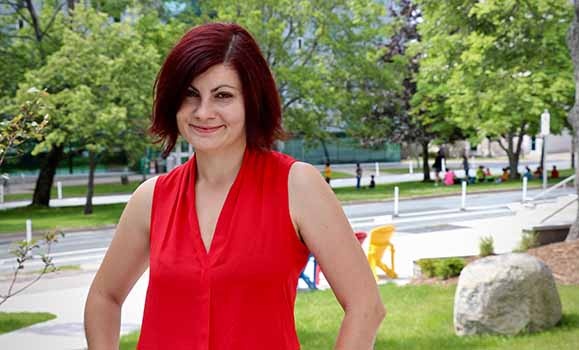News
» Go to news mainGet to Know...Professor Adelina Iftene

Professor Adelina Iftene, who originally hails from Romania, became a full-time faculty member at the Schulich School of Law on July 1. Previously, she was a SSHRC postdoctoral research fellow at Osgoode Hall Law School, and she is currently a member of the Prison Law Advisory Committee with Legal Aid Ontario. Iftene’s main areas of research and teaching interests are prison law, criminal law, sentencing, evidence, and Charter rights. This fall she’ll be teaching first-year Criminal Law and Evidence.Â
Why were you interested in teaching at the Schulich School of Law?
One of the things that drew me to this school was the sense of community. The atmosphere of collegiality, apparent through research collaborations and friendships, defines this institution so much more than other universities. The students are also very integrated in the research community; they are involved in administrative decisions, and they appear to have strong initiatives and to be highly motivated. In addition, Schulich is such a strong, interdisciplinary school. It has three institutes, and most faculty members are highly interested in and value multi-sectorial research. It is a perfect place for me to grow both as a teacher and as a researcher.
How did your interest in prison law begin?
I have worked extensively with disadvantaged groups of people both in Romania and Canada. When I came to Canada to do my master’s and to study the impact of the Charter on the correctional system, I was highly disappointed. I found that there were no more than a handful of scholars and lawyers interested in what is going on behind prison walls, and that much work lay ahead. Once I started entering prisons, the motivation to continue this work was reinforced. Each one of the incarcerated people I met, either in my research or volunteer work – each of their stories and the injustices they suffered at the hands of the system gives me yet another reason to do this work.
What can you tell us about your research?
My research is at the crossroads of penal policy, health care, human rights, Charter rights, and criminal justice. Currently I’m working on transforming my PhD dissertation into a book, which is under contract with University of Toronto Press, about the legal issues raised by the incarceration and treatment of older Canadian prisoners (it has gone to peer review). My biggest pieces of work have been around the aging population in prisons and the health problems and legal issues that can stem from institutions that aren’t responding appropriately.
What’s happening this fall?
I’ve put together a panel on issues around end-of-life care in prisons for the , which is taking place in Halifax from Sept. 13 to 15 and at which I will also be speaking. In addition, I will facilitate a satellite meeting workshop after the conference, on September 16, focusing solely on end-of-life in prison issues. The meeting brings together around 25 experts in different fields, from medical professionals and lawyers to academics.
Most major institutions involved in prison policy will be represented, including the Office of the Correctional Investigator, the Law Commission of Ontario, The Canadian Association of Elizabeth Fry Societies, John Howard Society, the Nova Scotia Barristers’ Society, and the National Medical Advisor to Correctional Service Canada. The aim is to create a report that hopefully will help the government implement better prison policies for assisted dying, palliative care, and compassionate release.
What excites you about this next chapter in your legal career?
Everything! I’m looking forward to teaching and working with students on issues around criminal justice in prisons and continuing my research by going into Nova Scotia prisons. I’m also excited to work with colleagues who have expertise in health law, criminal law, and administrative law, as well as other fields that will probably impact prison law. I’ve joined the Health Law Institute. I know that I’ll learn and grow from being part of this community of teachers, researchers, and human beings who are so warm and welcoming.
Recent News
- Professor Emeritus Rollie Thompson ft in "N.S. child welfare system 'incredibly broken,' say experts after guilty plea in toddler death"
- AV¾ãÀÖ²¿ Legal Aid Service Community Legal Worker Sydnee Blum ft in "5% Cap No Help For Low‑Income Renters"
- Assistant Professor Suzie Dunn ft in "Why it's taken so long to update the Criminal Code to include sexual deepfakes"
- Professor Emeritus Wayne MacKay ft in "This is Nova Scotia: The Furore Over Indigenous Cannabis Sales"
- Professor Emeritus Wayne MacKay ft in "Class‑action lawsuit against Nova Scotia Power important for accountability, says law prof"
- Professor Emeritus Wayne MacKay ft in "N.S. premier firm on cannabis crackdown as tensions grow with Mi’kmaq communities"
- Professor Emeritus Wayne MacKay ft in "N.S. premier responds to criticism from Mi’kmaq over cannabis crackdown"
- Associate Professor Andrew Flavelle Martin ft in "Immunity for Alberta attorney general necessary to ward off ‘political activism,’ attorney general says"
